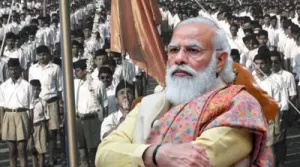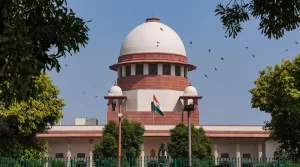Last night, I kept thinking about Junaid, the lynching victim. I was not thinking about the grown-up father and husband Junaid who was reportedly burnt alive by Hindutva extremists last week with his friend Nasir. I was thinking about the 16-year-old madrasa student Junaid, who was stabbed over 40 times in a moving train in Haryana when I had just passed out of school six years ago.
The graphic details, as they were divulged in the media, made my gut twist. As a teenager, I felt vulnerable – just as many other Muslims my age felt. This was the time when television channels had just begun their daily Muslim baiting, by asking why do Muslims not chant ‘Vande Mataram’ or ‘Bharat Mata ki Jai’ (in a few years, this narrative had shifted to ‘what’s the problem with shooting traitors’). I texted a close friend, who seemed unmoved. He asked me for evidence to prove that it was a hate crime. I was not a journalist at the time and it was not a part of my work to ogle at violent men threatening to kill millions, who, just like me, happen to be born Muslim.
Four years later, when my friend was no longer a friend, I saw Naresh Sehrawat, the prime accused in Junaid’s murder, at a Mahapanchayat organised in support of the accused in Asif’s lynching. He was proudly but slyly introduced as the one who had murdered a “jihadi” in a moving train. Now I had the evidence, not enough of course to get justice for Junaid, but enough to convince my friends that Junaid’s murder was indeed a hate crime.
Also present at that Mahapanchayat was the infamous gau rakshak, Monu Manesar, a key accused in the other Junaid’s lynching last week. He received equally loud applause from a bloodthirsty audience that kept cheering at the calls to murder more and more Junaids. Monu is a known name in that ecosystem. He is a content creator who enjoys an alarming following on social media. He posts videos of violence. He makes money out of it. He has a silver button on YouTube. In the pictures posted on his social media profiles, it seems like the police adores him and prominent ministers support him. He is not alone. There are many like him who post even more violent videos in which injured men who can barely walk are fed animal faeces, or men with broken teeth are stomped upon with dirty leather boots.
This impunity has not been achieved in a day. The murderers have been inspired by those “saints” who use prominent public squares to openly incite violence, a media that actively demonises victims, crumbling institutions that continue to look away, and many Hindus who fund and watch Monu Manesars. Except for a few Muslims and some of their well-meaning Hindu allies, the outrage against these horrors has been watered down with whataboutery, threats, abuse and, most annoyingly, the advice to not fall into the polarisation trap. Between the two Junaids, the #NotInMyName campaign vanished into oblivion and protest sites like the Jantar Mantar turned eerily silent. At best, Jantar Mantar is now a stage for hate mongers to call for genocide and threaten the Supreme Court, with no fear of the police.
In other circumstances, this would have been categorised as terrorism. Now that this behaviour is out in the open, even those well-wishers who once told the Muslims to look away and ignore what they thought was the polarising fringe, are themselves unable to look away.
This is why it is pertinent to not treat Junaid as a statistic. He was a home to a beating heart, a sanctuary to a dream. Junaid wanted to buy a second-hand bike with the money that he had been saving for a long time. He also liked cricket, his friends and brother told me. He had a family, part of whom died with him. I met his mother last year. When I looked into her stony large eyes, I felt extremely uncomfortable. Tears continued to roll down through the wrinkles on her worn out face as she remembered Junaid.
I read his brother’s post on Instagram in which he had shared visuals of the recent lynching and asked #KabTak (until when). How did he process the news that a person who shares his brother’s name has been killed before his own Junaid could get justice? He had also messaged me last night on WhatsApp: “Brother, there’s a small request, please take care when you step out.” Soon after, I trawled through his social media filled with posts demanding justice for his brother, holding a tricolour and placards. What explains the restraint in his anger? Can he not just scream or cry instead?
Translated, it says: “We have to watch it daily – someone getting killed, someone being assaulted, somewhere a home is demolished, somewhere a shop is burned down, someone giving a hate speech, someone betrayed us. And then a bitter voice beckons us, which has to be morally ignored to remind us of the lessons of humanity.”
This is not the story about how I feel as an individual, it’s about so many other young Indian Muslims whose social media feeds look like a visitors’ diary outside a busy graveyard. They know their privileges. Unlike the unfortunate Junaids, they don’t get lynched so easily and so often. But also unlike the big five, they can’t sit comfortably at the same table with Mohan Bhagwat and talk peace while more Junaids continue to get hacked or burnt alive. They appear bitter when they say that they also feel afraid for their old fathers who step out in the streets, especially if they come from tier-two cities across North India. Young middle class Muslims, competing to get the best jobs, have many poor relatives who stand the risk of being attacked, their carts flipped over and dignity desecrated publicly. Like Afreen Fatima, they have a home and a family that they don’t want to see get turned into ruble under the unrelenting arm of the bulldozer.
They also share the burden forced on an entire generation of even younger Muslims, cousins and friends, who have no choice but to witness abuse and violence of all kinds. They find solidarity in congregations to grieve and rant against accusations of humiliating propaganda like ‘COVID jihad’ and ‘spit jihad’. For millions of young, middle-class, English-speaking Muslims like me, India would actually have been a “heaven for minorities”, as the former lone Muslim cabinet minister in the Modi government called it, if Junaid’s murder hadn’t bothered and disturbed us as much as it should have bothered our Hindu friends, in whose name this violence is being perpetrated.
(Alishan Jafri is a freelance journalist. Courtesy: The Wire.)




